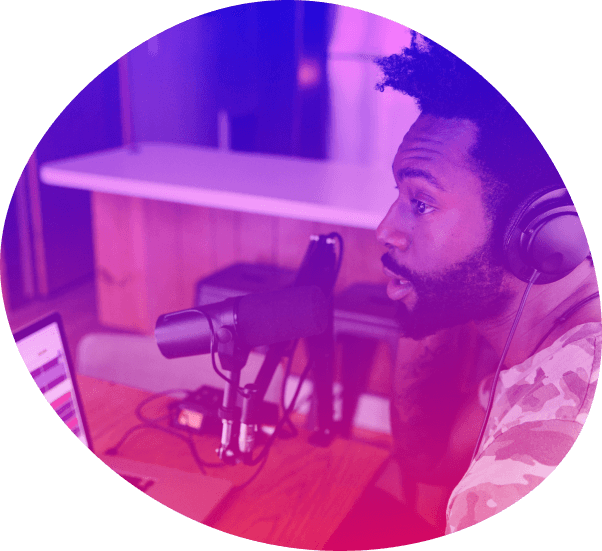Hosting a podcast interview is a lot harder than it sounds. It’s not a simple as having a friendly chat in front of a pair of microphones. If you don’t prepare, you could end up with a boring interview that fails to entertain your listeners and bad reviews.
Or worse, your interview could erode into a sales pitch. There’s nothing worse than having a discussion with someone who only wants to sell their product.
How to do you make sure you host a great podcast interview? By preparing in advance.
In this article, we’d like to give you some important tips to preparing for your podcast interview.
1. Choose Interesting Guests
Some guest are, well… boring. Other guests aren’t right for your show. If you interview people who don’t add much value to your listeners’ lives, you’re all but guaranteed to host a terrible podcast interview.
Invite podcast guests who have unique angles. Find people who do things differently or refuse to follow the pack. Look for guests who overcame unique or unexpected challenges.
Yes, it’s harder to get interesting guests than average ones. But if you interview regular people who just punch the clock every day, you’ll struggle to keep your listeners engaged.
2. Do Some Background Research on Your Subject
A podcast interview shouldn’t be your first exposure to your subject. You should know at least a little about them before the show starts. Your job is to expose the interviewee to your audience, so it helps to know enough about the subject to get the ball rolling.
Dig into your guest’s online persona. Read their articles, troll through their social media profiles, and Google around for what they’ve said online (or what other people have said about them). Take note of their big accomplishments, like winning an award, writing a book, or speaking at an event.
3. Get to Know Your Interviewee’s Work
Part of researching your guest means making yourself familiar with their work. You should read their blog posts, check out their social media pages, watch their videos, and listen to any other podcasts they’ve been on. If they have a book, you should read it – or at least the relevant parts.
In addition to their work, listen to your guests most recent interviews. Take note of which questions they are consistently asked and avoid them. Find your angle and craft questions that will require them to provide unique answers. You don’t want your interview to sound like every other one they’ve given. Making yourself familiar with your guests’ work could take some time, but it’s worth the reward.
4. Write The Guest’s Bio For Them
Most guests have a prepared bio: A statement about what they do, where they studied/worked, and what they’re working on now. It sometimes includes a plug for their latest book, project, or product.
If you ask your guest something like “Can you tell our listeners what you do?” or say “Tell us about yourself,” they’ll give you their prepared bio.
In some cases, these bios are long and boring. Other times they’re so short that they don’t add much. Often they use the exact same wording all over the place, so your listeners have heard it before.
Blow past this nonsense in your podcast interview by preparing your own bio for the guest. Browse their social media, read their website’s “About” page, and use what you learned from your research. Check out these great examples.
Most importantly, write the bio in the context of your audience. Pick the elements that are most relevant to your listeners.
5. Determine Where Your Subject Meets Your Audience
Your podcast interview is for your audience, so it’s important to determine what your interviewee knows that appeals to your listeners. There’s no sense going over things your audience already knows, or things they don’t care about. You need to extract information from your guest that matters the most to your fans.
Take note of anything that would be especially interesting to your audience as you conduct your background research. Don’t be afraid to ignore something unique about your guest if you don’t think it will matter to your listeners.
6. Prepare Your Questions In Advance
This one seems obvious, but it’s worth saying. You don’t need to prepare every word you’ll say, but it’s important to have a core list of questions you intend to ask. It also helps to have a secondary list of potential questions to ask if you have time.
That said, don’t be afraid to veer off your planned course during the interview. Using only prepared questions can make your conversation feel disjointed and artificial. Respond to your guest with unique and genuine questions.
Here are a few tips to help you develop quality questions:
Avoid asking basic questions
They make it seem like you don’t know the person you’re interviewing. These are bad: “What are you best known for?” or “What book are you promoting?” Instead, set up good questions by establishing a premise beforehand, like this: “You’re best known for book on productivity. Why do you think people resonate with your approach?”
Don’t ask yes/no questions
A yes/no question is any question the interviewee can answer with a simple “yes” or “no.” They can be painfully awkward if your guest isn’t naturally forthcoming. Ask questions that encourage the guest to expand.
Don’t ask leading questions
A leading question gives your guest an easy answer they can simply parrot back to you. For example, this is bad: “Would you say that was a frustrating experience?” Here’s a better alternative: “What was that experience like for you?”
Ask one question at a time
Don’t pack multiple questions into one unless they are closely related. This is bad: “What did your clients think and how did it improve your production process?” They can be confusing, especially if the guest has a lot to say. Ask your questions one at a time as you would in natural conversation.
Don’t refer to your list of questions
Saying something like “The next question on my list…” sounds stiff and fake. It makes your listener aware that you’re hosting a prepared interview rather than an organic discussion.
Focus on “how” and “why” questions
These types of questions drill down into things that matter. For instance, it’s interesting to know that an entrepreneur pivoted his business, but it’s far more interesting to know why and how he did it.
Start from the beginning
You may be tempted to ask your juiciest question first, especially if you know your audience desperately wants the answer. But that approach takes away your listeners’ incentive to stick with your episode. It also confuses anyone who doesn’t already know the context.
Think of each interview like a story. Your role is pull it out of your guest one question at a time. Prepare more questions than you’ll probably need just in case, but be prepared to skip over many of them during the interview.
7. Send Your Questions To Your Guest Before The Interview
Once you create your questions, send them to your guest at least a week before you record the episode. This will give them time to organize smart responses. They may choose to simply think about their answers in their head or they might write out detailed responses. Either way they’ll feel more comfortable and help you create better content.
This is a good time to ask your guest for any stories that relate to your questions. Then you can prompt the guest for those stories during the interview. (Storytelling is very important.)
Here is a template email you can use to prepare your guests ahead of their interview date.
8. Brief Your Guest About Your Show
u’ll host a better podcast interview if your guest knows a little something about the show and your audience. Send a brief email that explains…
- Your podcast format
- Your typical listener
- How much of their time you’ll need
- How you’ll promote the episode
This type of information will help your guest tailor their answers to your audience. It will also make them feel comfortable during your conversation because there won’t be any surprises.
9. Minimize Any Distractions
When you invite someone to have a conversation for your podcast, make sure you’ll have nothing else going on at that time. Lock your office door and silence your phone. If you have a pet, take care of its needs before the interview so it doesn’t bother you during the session. Reduce or eliminate anything you might find distracting.
A break in the interview can absolutely ruin its flow, especially if your interviewee uses the break to check their email, make a call, or spend a few moments on another task. Do whatever you can to maintain the guest’s focus.
Take Your Podcast Interview Seriously!
We’ve given you a bunch of great tips to host an amazing podcast interview, but our last one is the most important: Take your interview seriously. Unless you’ve hosted hundreds of interviews in the past or are intimately knowledgeable about your interviewee, you must prepare ahead of time. If you don’t, you’ll ask weak questions and seem silly in front of your guest.





Comments are closed.